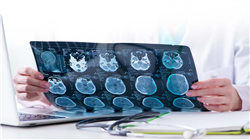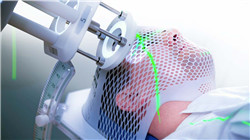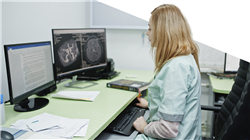University certificate
The world's largest faculty of medicine”
Why study at TECH?
With this complete 100% online program, you will acquire a solid mastery in the use of Augmented Reality (AR) and Artificial Intelligence techniques applied to 3D images for health”

Artificial Intelligence has proven to be a key tool in the evolution of diagnostic imaging, allowing physicians to obtain more accurate and faster results. Currently, its application goes beyond the simple interpretation of images, facilitating the early identification of diseases and offering advanced support in clinical decision making. In this way, it is possible to understand how AI can be integrated into their daily practice, optimizing both workflow and diagnostic accuracy.
In this Postgraduate certificate, physicians will begin by exploring the most advanced AI technologies and tools applied to diagnostic imaging, such as IBM Watson Imaging Clinical Review. They will also be updated in the use of leading software platforms in medical image analysis, as well as Deep Learning tools specifically designed for radiology. Throughout the program, they will delve into the statistical methods and algorithms essential for the interpretation of medical images. Therefore, with the help of tools such as DeepMind AI for Breast Cancer Analysis, physicians will master segmentation algorithms, classification techniques, convolutional neural networks and advanced methods to improve image quality.
Finally, advanced techniques, such as subtle pattern detection in low-resolution images, fundamental for early diagnosis of neurodegenerative diseases and applications in Interventional Cardiology, will be reviewed. In addition, Natural Language Processing (NLP) for medical documentation and the use of advanced visualization tools, such as OsiriX MD, will be essential.
Therefore, the Postgraduate certificate is supported by the innovative Relearning system, developed by TECH, offering a disruptive experience. In fact, it will feature a wide variety of multimedia resources, additional readings and detailed videos. Thanks to its flexible methodology and without fixed schedules, graduates will be able to adapt their academic space to their professional commitments, only needing an electronic device with an Internet connection to access the Virtual Campus
This Postgraduate certificate offers physicians a comprehensive update on the latest Artificial Intelligence tools applied to diagnostic imaging, with the support of the renowned Relearning methodology”
This Postgraduate certificate in Artificial Intelligence Innovations in Diagnostic Imaging contains the most complete and up-to-date scientific program on the market. The most important features include:
- The development of practical cases presented by experts in Artificial Intelligence applied to Diagnostic Imaging
- The graphic, schematic and eminently practical contents with which it is conceived gather scientific and practical information on those disciplines that are indispensable for professional practice
- Practical exercises where the self-assessment process can be carried out to improve learning
- Its special emphasis on innovative methodologies
- Theoretical lessons, questions to the expert, debate forums on controversial topics, and individual reflection assignments
- Content that is accessible from any fixed or portable device with an Internet connection
Enroll and acquire skills to compare, through advanced statistical methods, the performance of Artificial Intelligence, from the hand of the best digital university in the world, according to Forbes: TECH”
The program’s teaching staff includes professionals from the industry who contribute their work experience to this program, as well as renowned specialists from leading societies and prestigious universities.
The multimedia content, developed with the latest educational technology, will provide the professional with situated and contextual learning, i.e., a simulated environment that will provide immersive education programmed to learn in real situations.
This program is designed around Problem-Based Learning, whereby the professional must try to solve the different professional practice situations that arise during the course. For this purpose, students will be assisted by an innovative interactive video system created by renowned and experienced experts.
Master the use of Nuance PoweScribe 360 to generate medical image reports automatically, improving efficiency and accuracy in clinical workflow"

Delve into Deep Learning techniques for time series analysis of functional images, improving accuracy in the diagnosis and monitoring of complex diseases"
Syllabus
The Postgraduate certificate in Artificial Intelligence Innovations in Diagnostic Imaging has been designed with the needs of students in mind, with a 100% online format that allows them to decide when and where to study, adapting to their availability, schedules and interests. This program, which takes place over 6 weeks, offers a unique and enriching experience, aimed at preparing physicians for success. Graduates will acquire advanced clinical competencies, focused on the mastery of innovative image processing techniques, such as Deep Learning.

TECH offers you the most complete Postgraduate certificate to enhance your skills in the application of Artificial Intelligence in Diagnostic Imaging. What are you waiting for to enroll?"
Module 1. Artificial Intelligence Innovations in Diagnostic Imaging
1.1. Artificial Intelligence Technologies and Tools in Diagnostic Imaging with IBM Watson Imaging Clinical Review
1.1.1. Leading Software Platforms for Medical Image Analysis
1.1.2. Radiology-Specific Deep Learning Tools
1.1.3. Innovations in Hardware to Accelerate Image Processing
1.1.4. Integration of Artificial Intelligence Systems in Existing Hospital Infrastructures
1.2. Statistical Methods and Algorithms for Medical Image Interpretation with DeepMind AI for Breast Cancer Analysis
1.2.1. Image Segmentation Algorithms
1.2.2. Classification and Detection Techniques in Medical Images
1.2.3. Use of Convolutional Neural Networks in Radiology
1.2.4. Noise Reduction and Image Quality Improvement Methods
1.3. Design of Experiments and Analysis of Results in Diagnostic Imaging with Google Cloud Healthcare API
1.3.1. Design of Validation Protocols for Artificial Intelligence Algorithms
1.3.2. Statistical Methods for Comparing the Performance of Artificial Intelligence and Radiologists
1.3.3. Setting Up Multicenter Studies for Artificial Intelligence Testing
1.3.4. Interpretation and Presentation of Performance Test Results
1.4. Detection of Subtle Patterns in Low-Resolution Images
1.4.1. Artificial Intelligence for Early Diagnosis of Neurodegenerative Diseases
1.4.2. Artificial Intelligence Applications in Interventional Cardiology
1.4.3. Use of Artificial Intelligence for the Optimization of Imaging Protocols
1.5. Biomedical Image Analysis and Processing
1.5.1. Pre-Processing Techniques to Improve Automatic Interpretation
1.5.2. Texture and Pattern Analysis in Histological Images
1.5.3. Extraction of Clinical Features from Ultrasound Images
1.5.4. Methods for Longitudinal Analysis of Images in Clinical Studies
1.6. Advanced Data Visualization in Diagnostic Imaging with OsiriX MD
1.6.1. Development of Graphical Interfaces for 3D Image Exploration
1.6.2. Tools for Visualization of Temporal Changes in Medical Images
1.6.3. Augmented Reality Techniques for the Teaching of Anatomy
1.6.4. Real-Time Visualization Systems for Surgical Procedures
1.7. Natural Language Processing in Medical Image Documentation and Reporting with Nuance PowerScribe 360
1.7.1. Automatic Generation of Radiological Reports
1.7.2. Extraction of Relevant Information from Electronic Medical Records
1.7.3. Semantic Analysis for the Correlation of Imaging and Clinical Findings
1.7.4. Image Search and Retrieval Tools Based on Textual Descriptions
1.8. Integration and Processing of Heterogeneous Data in Medical Imaging
1.8.1. Fusion of Imaging Modalities for Complete Diagnostics
1.8.2. Integration of Laboratory and Genetic Data in the Image Analysis
1.8.3. Systems for Handling Large Volumes of Imaging Data
1.8.4. Strategies for Normalization of Datasets from Multiple Sources
1.9. Applications of Neural Networks in Medical Image Interpretation with Zebra Medical Vision
1.9.1. Use of Generative Networks for the Creation of Synthetic Medical Images
1.9.2. Neural Networks for Automatic Tumor Classification
1.9.3. Deep Learning for the Analysis of Time Series in Functional Imaging
1.9.4. Fitting of Pre-Trained Models on Specific Medical Image Datasets
1.10. Predictive Modeling and its Impact on Diagnostic Imaging with IBM Watson Oncology
1.10.1. Predictive Models for Risk Assessment in Oncology Patients
1.10.2. Predictive Tools for Chronic Disease Follow-Up
1.10.3. Survival Analysis Using Medical Imaging Data
1.10.4. Prediction of Disease Progression using Machine Learning Techniques

The teaching materials of this program, elaborated by these specialists, have contents that are completely applicable to your professional experiences"
Postgraduate Certificate in Artificial Intelligence Innovations in Diagnostic Imaging
Diagnostic imaging has undergone a radical transformation in recent years thanks to artificial intelligence (AI). AI applied to diagnostic imaging not only speeds up analysis processes, but also reduces error margins, which translates into a direct impact on patient care. TECH Global University, understanding the growing demand for professionals specialized in this area, has developed this Postgraduate Certificate in Artificial Intelligence Innovations in Diagnostic Imaging. A 100% online program that will allow you to delve into the use of these new tools, analyzing the latest technological advances in AI and its application in the interpretation of medical images such as CT scans, MRIs and ultrasounds. In addition, you will learn to use the most advanced algorithms for the early detection of diseases, increasing the accuracy of diagnoses. In this way, you will acquire the necessary tools to implement AI in your diagnostic routines.
Specialize in artificial intelligence applied to medical diagnosis
AI has enabled the development of systems capable of analyzing large volumes of data with unprecedented accuracy, improving the ability to detect and treat various pathologies. Therefore, TECH will provide you with the essential tools to excel in this field. The online modality provides you with the necessary flexibility to acquire this knowledge without compromising your work responsibilities, guaranteeing a comfortable and effective learning experience. Throughout the course, you will study topics such as process automation in radiology, the use of machine learning and deep learning algorithms, and the integration of AI platforms in hospital systems. In addition, you will address the analysis of large volumes of data and how these predictive models are used to identify disease patterns more effectively. In short, this program will not only open up new job opportunities, but will also allow you to be part of the digital transformation that is revolutionizing healthcare worldwide. Enroll now!







